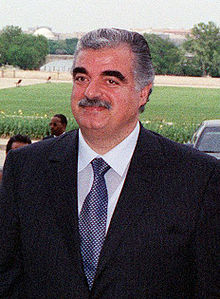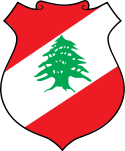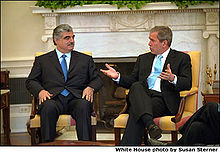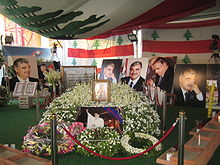- Rafic Hariri
-
This article is about the former Lebanese prime minister. For the writer, see Al-Hariri of Basra.
Rafic Hariri
رفيق حريري
Prime Minister of Lebanon In office
31 October 1992 – 2 December 1998Preceded by Rashid el-Solh Succeeded by Selim al-Hoss In office
23 October 2000 – 21 October 2004Preceded by Selim al-Hoss Succeeded by Omar Karami Personal details Born November 1, 1944
Sidon, LebanonDied February 14, 2005 (aged 60)
Beirut, LebanonPolitical party Future Movement Religion Sunni Islam Lebanon 
This article is part of the series:
Politics and government of
LebanonPresidencyGovernment- Prime Minister
- Cabinet
Legislature- Parliament
- Current members
- Presidential 2008
- Parliamentary 2009
- Local 2010
Other issues- Governorates
- Districts
- Municipalities
- Armed Forces
- Human rights
- Foreign relations
Rafic Baha El Deen Al-Hariri (November 1, 1944 – February 14, 2005, Arabic: رفيق بهاء الدين الحريري), was a business tycoon and the Prime Minister of Lebanon from 1992 to 1998 and again from 2000 until his resignation, 20 October 2004.
He headed five cabinets during his tenure. Hariri dominated the country's post-war political and business life and is widely credited with reconstructing Beirut after the 15-year civil war.
Hariri was assassinated on 14 February 2005 when explosives equivalent to around 1000 kg of TNT were detonated as his motorcade drove past the St. George Hotel in the Lebanese capital, Beirut. The investigation, by the Special Tribunal for Lebanon, into his assassination is still ongoing and currently led by the independent investigator Daniel Bellemare. In its first two reports, UNIIIC indicated that the Syrian government may be linked to the assassination.[1] According to a Canadian Broadcasting Corporation news investigation, the special UN investigation team had found strong evidence for the responsibility of Hezbollah in the assassination.[2] Hariri's killing led to massive political change in Lebanon, including the Cedar Revolution and the withdrawal of Syrian troops from Lebanon.
Contents
Background
Hariri was born in a modest Sunni Muslim family, along with two siblings (brother, Shafic and sister Bahia) in the Lebanese port city of Sidon. Hariri attended elementary and secondary school in his city and pursued his business administration studies at the Beirut Arab University.
Rise to wealth
In 1969, Hariri established Ciconest, a small subcontracting firm, which went out of business soon. He then went in business with the French construction firm Oger for the construction of a hotel in Ta’if, Saudi Arabia, the timely construction of which brought him in good graces with King Khaled. Hariri took over Oger, forming Oger International, which became the main construction firm used by the Saudi Royal family for all of their important developments. As a result, only a few years after his first contract with King Khaled, Hariri had become a multi-billionaire.
Beginnings in philanthropy
Having accumulated his wealth, Hariri started a number of philanthropic projects, including the building of educational facilities in Lebanon. Hariri became progressively more embroiled in politics. His appeals to the U.N. and services as an emissary to the Saudi Royal family won him international recognition on the political stage for his humanitarian efforts but also slowly caught him in the web of Lebanese politics.
In 1982, he donated $12 million to Lebanese victims of the 1978 South Lebanon conflict and helped clean up Beirut's streets with his company's money. After the conflict, he acted as an envoy of the Saudi royal family to the country. He laid the groundwork that led to the 1989 Taif Accord, which Saudi Arabia organised to bring the warring factions together. Taif put an end to the civil war and paved the way for Hariri to become prime minister.
Political career
Hariri returned to Lebanon in the early 80s as a wealthy man and began to build a name for himself by making large donations and contributions to various groups in Lebanon. He was implanted as the Saudis' strong man following the collapse of the PLO and the paucity of any viable Sunni leadership in the country, as well as a response to the rising power of the Shiite militia Amal. In 1992, becoming prime minister under Syria's watchful military occupation of Lebanon, he put the country back on the financial map through the issuing of Eurobonds and won plaudits from the World Bank for his plan to borrow reconstruction money as the country's debt grew to become the largest per capita in the world.
1992-1998 economic political policies
Hariri implemented an aggressive new economic policy. Perhaps Hariri's most important creation in the beginning of his career was "Horizon 2000" the government's name for its new rejuvenation plan. A large component of "Horizon 2000" was Solidere, the privately-owned[3] construction company that was established to reconstruct post-war Lebanon. Solidere was owned by the government and private investors. Solidere was largely focused on redeveloping Beirut's downtown and turning it into a new urban center as quickly as possible as one aspect of the various infrastructure redevelopment plans that would be implemented by "Horizon 2000". Another aspect of the decade-long plan was the privatization of major industries. Numerous contracts were awarded in important industries such as energy, telecommunications, electricity, airports and roads. The last and perhaps most significant aspect of "Horizon 2000" was economic stimulus via foreign direct investment. Specifically, Hariri supported foreign firms and individuals taking an interest in Lebanon's developmental potential. Hariri simplified tax codes and provided tax breaks to foreign investors. Due to his previous successes in the private sector and the numerous resulting international connections, Hariri was able to garner a significant amount of low-interest loans from foreign investors. Hariri also pursued aggressive macroeconomic policy such as maintaining strict regulations on bank reserves and inter-bank interest rates to curb inflation and raise the value of the Lebanese pound relative to the dollar. Hariri's economic policies were a remarkable success during his first year in office. From 1992-1993 there was a 6 percent increase in real national income, the capital base of commercial banks effectively doubled, the budgetary earnings hovered at around a billion dollars, and commercial banks’ consolidated balance sheets increased about 25%. By 1998, however, real GDP growth was around 1%, a year later it would be -1%, national debt had skyrocketed 540% from two to eighteen billion dollars, Lebanon's economy was in a miserable state.
Hariri and Lebanon's political environment
 George W. Bush and Hariri meeting in the White House
George W. Bush and Hariri meeting in the White House
Amid the political crisis brought on by the extension of President Émile Lahoud's term, Hariri resigned as Prime Minister, saying: "I have... submitted the resignation of the government, and I have declared that I will not be a candidate to head the (next) government."
During a BBC interview in 2001,[4][5] Harīrī was asked by Tim Sebastian why he refused to hand over members of Hezbollah that were accused by America of being terrorists. He responded that Hezbollah were the ones protecting Lebanon against the Israeli occupation and called for implementation of passed United Nations resolutions against Israel. He was further accused of making the American coalition in the War on Terrorism worthless and asked if he was ready for the consequences of his refusal, reminding him that George W. Bush had said: "Either you are with us, or you are with the terrorists".[6] He replied that he had hoped that there would be no consequences, but would deal with them if they arrive. Hariri further said that he opposed the killing of all humans - Israeli, Palestinian, Syrian or Lebanese - and believed in dialogue as a solution. He further went on to say that Syria will have to stay in Lebanon for protection of Lebanon until they are no longer needed and Lebanon asks them to leave.
Lebanese Druze leader Walid Jumblatt, a recent recruit of the anti-Syrian opposition, emboldened by popular anger and civic action now being called Lebanon's "Cedar Revolution," alleged in the wake of the assassination that in August 2004 Syrian President Bashar al-Assad threatened Hariri, saying "[President of Lebanon] Lahoud is me. ... If you and Chirac want me out of Lebanon, I will break Lebanon.".[7] He was quoted as saying "When I heard him telling us those words, I knew that it was his condemnation of death."
On June 22, 2005, Beirut International Airport was renamed Rafic Hariri International Airport.[8] Additionally, Beirut General University hospital was renamed Rafiq Hariri Hospital.[8]
Assassination
Main article: Assassination of Rafic HaririOn 14 February 2005 Hariri was killed, along with 21 others, when explosives equivalent of around 1,000 kg of TNT were detonated as his motorcade drove near the St. George Hotel in Beirut. Among the dead were several of Hariri's bodyguards and his friend and former Minister of the Economy Bassel Fleihan. Hariri was buried along with his bodyguards, who died in the bombing, in a location near Mohammad Al-Amin Mosque.
A 2006 report by Brammertz has indicated that DNA evidence collected from the crime scene suggests that the assassination might be the act of a young male suicide bomber.[9] A UN backed tribunal issued four arrest warrants to members of the Hezbollah.[10] Hezbollah blames the assassination on Israel.[11]
A 2010 blog post by French political analyst Thierry Meyssan alleged that the crater found on the scene of Hariri's assassination could not have been produced by a car bomb. Rather a UAV-launched nuclear missile employing nanotechnology was theorized.[12]
Aftermath
Main article: Cedar RevolutionHariri was well regarded among international leaders, for example, he was a close friend of French President Jacques Chirac. Chirac was one of the first foreign dignitaries to offer condolences to Hariri's widow in person at her home in Beirut. The Special Tribunal for Lebanon was also created at his instigation.
Syria was initially accused of the assassination, which led to the withdrawal of Syrian troops from Lebanon following widespread protests.
Following Hariri's death, there were several other bombings and assassinations against minor anti-Syrian figures. These included Samir Kassir, George Hawi, Gebran Tueni, Pierre Amine Gemayel, and Walid Eido. Assassination attempts were made on Elias Murr, May Chidiac, and Samir Shehade (who was investigating Hariri's death).[citation needed]
The United Nations special tribunal (see Special Tribunal for Lebanon) investigating the murder of Hariri is expected to issue draft indictments accusing Hezbollah of murdering Hariri.[13][14]
Hezbollah has accused Israel of the assassination of Hariri. According to Hezbollah officials, the assassination of Hariri was planned by the Mossad as a means of expelling the Syrian army from Lebanon. In August 2010, Hezbollah leader Hassan Nasrallah presented "evidence", consisting of intercepted Israeli spy-drone video footage, which he said implicated Israel in the assassination of Hariri.[15] After an altercation between male Tribunal staff and women at a gynecology clinic in October 2010, Hezbollah demanded that the Lebanese government stop all cooperation with the Special Tribunal, claiming the tribunal to be an infringement on Lebanese sovereignty by western governments. On November 1, 2010, a report was leaked by Al-Akhbar, a local secular, leftist newspaper, stating that Hezbollah has drafted plans for a quick takeover of the country in the case an indictment against its members is issued by the UN Special Tribunal.[16] The report states that Hezbollah conducted a simulation of the plan on October 28, immediately following a speech by its secretary general.[17]
On the other side, it has been revealed by leaked US embassy cables that Egyptian General Intelligence Directorate director Omar Suleiman reported that Syria "desperately" wanted to stop the investigation of the Tribunal.[18]
Corruption
Hariri was considered, mainly by his opponents, as the principal actor in the widespread corruption that plagued Lebanon during the Syrian occupation. His wealth grew from less than $1 billion dollars when he was appointed prime minister in 1992, to over $16 billion when he died. The Company for the Development and Reconstruction of Beirut's Central District, known as Solidere, in which Hariri is the primary shareholder, expropriated most property in the central business district of Beirut, compensating each owner with shares in the company, were worth as little as 15% of the property's value. That Hariri and his business associates profited immensely from this project was an open secret.[19][20]
Hariri and his protégés were not the only beneficiaries of this spending spree. In order to secure support from militia chieftains, such as Walid Jumblatt and Nabih Berri, and pro-Syrian ideologues that Damascus had installed in the government, Hariri allowed kickbacks from public spending to enrich all major government figures. For example, a contract to build a section of the coastal motorway was awarded to the firm of Randa Berri, the wife of Parliament Speaker Nabih Berri, at a price estimated to be at least $100 million in excess of construction costs. Contracts for the import of petroleum were awarded to the two sons of President Elias Hrawi.[19][20]
As result of the growing criticism and popular discontent with Hariri's policies, the government banned public demonstrations in 1994 and relied upon the Army to enforce the decree.[19][20]
In return for a relatively free hand in economic matters, Hariri cooperated with Syria's drive to consolidate its control over Lebanon. Under the guise of "regulating" the audiovisual media, the government placed control of all major television and radio stations in the hands of pro-Syrian elites. Supporters of Michel Aoun were also perpetually harassed and detained.[19][20]
His is mainly credited with the widespread corruption that followed the war and the crippling damages done to the economy, with the public debt rising from $2.5 billion to over $40 billion and economic growth slowing from 8% to –1% during his time as prime minister.
References
- ^ Washington, The (2006-11-19). "Washington Times - Lebanon on a tinderbox". Washtimes.com. http://www.washtimes.com/commentary/20061119-102612-1990r.htm. Retrieved 2011-07-04.
- ^ "CBC Investigation: Who killed Lebanon's Rafik Hariri?". CBC News. 21 November 2010. http://www.cbc.ca/world/story/2010/11/19/f-rfa-macdonald-lebanon-hariri.html.
- ^ "''About Solidere''". Solidere.com. http://www.solidere.com/solidere.html. Retrieved 2011-07-04.
- ^ "''BBC Interview With Rafiq Hariri''". Informationclearinghouse.info. http://www.informationclearinghouse.info/article8295.htm. Retrieved 2011-07-04.
- ^ "''Rafiq Hariri''". BBC News. 2005-02-16. http://news.bbc.co.uk/1/hi/programmes/hardtalk/4270601.stm. Retrieved 2011-07-04.
- ^ ""You Are Either With Us Or With The Terrorists", President Bush Warns". Iran-press-service.com. http://www.iran-press-service.com/articles_2001/sep_2001/bush_congress_address_21901.htm. Retrieved 2011-07-04.
- ^ By Neil Macfarquhar. "The New York Times > International > Middle East > Behind Lebanon Upheaval, 2 Men's Fateful Clash". Lebanon;Syria: Nytimes.com. http://www.nytimes.com/2005/03/20/international/middleeast/20lebanon.html?ei=5094&en=441b692d8c0ef46a&hp=&ex=1111294800&partner=homepage&pagewanted=all&position=. Retrieved 2011-07-04.
- ^ a b "Rafiq Al-Hariri's biography". Rafiq Hariri Foundation. http://rhf.org.lb/index.php?option=com_content&task=view&id=9&Itemid=12. Retrieved 2008-03-01.
- ^ "UN probe into murder of former Lebanese leader nears sensitive stage – inquiry chief". Un.org. http://www.un.org/apps/news/story.asp?NewsID=21034&Cr=leban&Cr1=. Retrieved 2011-07-04.
- ^ Owen Bennett-Jones (2011-06-30). "BBC News - Hariri murder: UN tribunal issues arrest warrants". Bbc.co.uk. http://www.bbc.co.uk/news/world-middle-east-13972350. Retrieved 2011-07-04.
- ^ By the CNN Wire Staff (2011-06-30). "Hezbollah leader says Israel was behind Hariri killing - CNN.com". Edition.cnn.com. http://edition.cnn.com/2011/WORLD/meast/07/02/lebanon.nasrallah.hariri/. Retrieved 2011-07-04.
- ^ Meyssan, Thierry (29 November 2010). "New relevations on Rafik Hariri’s assassination". Infidata – Voice of Palestine. Harb, Elias F.. http://www.intifada-palestine.com/2010/11/new-revelations-on-rafik-hariri%E2%80%99s-assassination/. Retrieved 3 July 2011.
- ^ New Evidence Points to Hezbollah in Hariri Murder, By Erich Follath
- ^ Hezbollah and allies resign, toppling Lebanon government, by Laila Bassam reporting for Reuters
- ^ Hezbollah chief: Israel killed Hariri, by CNN Wire Staff
- ^ * Hezbollah Threatens an 'Explosion' in Beirut Over Tribunal, Stratfor Global Intelligence.
- Lebanese Daily: Hizbullah Drills Takeover of Lebanon, November 3, 2010, The Middle East Research Institute.
- ^ * [1], Now Lebanon.
- ^ "US embassy cables: Egypt spy chief promises pressure on Hamas". The Guardian (London). 28 November 2010. http://www.guardian.co.uk/world/us-embassy-cables-documents/136139.
- ^ a b c d Fisk, Robert (6 December 1998). "Lebanon's vast web of corruption unravels". The Independent (London). http://www.independent.co.uk/news/lebanons-vast-web-of-corruption-unravels-1189670.html. Retrieved 25 June 2011.
- ^ a b c d Ciezadlo, Annia (February 21, 2007). "Sect Symbols". The Nation (New York City). Archived from the original on 2007-12-06. http://web.archive.org/web/20071206142558/http://www.thenation.com/doc/20070305/ciezadlo. Retrieved 25 June 2011.
Books
- Sallam, Qasim (1980). Al-Baath wal Watan Al-Arabi [Arabic, with French translation] ("The Baath and the Arab Homeland"). Paris: EMA. ISBN 2-86584-003-4
External links
- Rafic Hariri Official site with news, video, press releases, speeches, statements, government policy, Cabinet decisions and UN resolutions
- Future Movement Forum Future Movement Discussion Forum
- Appearances on C-SPAN
- Rafic Hariri on Charlie Rose
- Rafic Hariri collected news and commentary at Al Jazeera English
- Lebanon unhappy over US sanction move, 12 October 2003
- Rafic Hariri collected news and commentary at The Jerusalem Post
- Rafic Hariri collected news and commentary at The New York Times
- Works by or about Rafic Hariri in libraries (WorldCat catalog)
- Rafic Hariri at the Notable Names Database
- Rafic Hariri at the Open Directory Project
- Obituaries
- Obituary-Rafīq Harīrī, BBC News, 14 February 2005
- Obituary-Rafīq Harīrī - Lebanese Club @ MIT, President, Loai Naamani 15 February 2005
- Obituary-Rafīq Harīrī, Daily Telegraph, 15 February 2005
- Obituary-Rafīq Harīrī, The Guardian, 15 February 2005
- Obituary-Rafīq Harīrī, The Times, 16 February 2005
- Obituary-Rafīq Harīrī, Islamica Magazine, [Summer] 2005
- Articles
- 'Beirut bombshell' - Fortune, Mitchell Protero, 4 May 2006
- Connecting the dots in Lebanon - Ya Libnan, 2 December 2006
- RafiqHariri.tk ongoing news reports
- Harīrī.org memorial page with news reports
- [2] 'March for the martyr: Harīrī Remembered' Arabian Business, Massoud A. Derhally 14 February 2006
- Timeline: Lebanon A chronology of key events - BBC News 14 February 2005
- Harīrī's Absence Hard to Fill - New York Newsday 14 February 2005
- Lebanese prime minister Harīrī resigns - Aljazeera.net 20 October 2004
- The Los Angeles World Affairs Council Speech LAWAC 18 December 1996
- "Mr. Miracle" - TIME EUROPE 8 February 1993
- Other
- The Fitzgerald report (link to the UN website) - 24 March 2005
- The Mehlis report (link to the UN website) - 20 October 2005
- Lebanese prime minister quits, By Brent Sadler, Caroline Faraj and Nada el-Husseini, CNN 15 April 2003
- Ambassador Farid Abboud discusses assassination: Farid Abboud
- Huge blast kills Lebanese ex-PM — Previously unknown group claims responsibility, CNN 14 February 2005
- Harīrī's comeback in Lebanon, BBC News 4 September 2000
- Al-Harīrī, Rafīq & family, 58, self-made, Forbes October 2002
- US Warns of UN Penalties After Lebanon Killing, Reuters Mon 14 February 2005
- Blasts, then silence: Cease-fire begins, CNN 26 April 1996
- INDEPTH: LEBANON Lebanon CBC News Online, Canadian Broadcasting Corporation, 15 February 2005
- Syria accused of killing Lebanon's ex-leader By Ramsay Short in Beirut and Anton La Guardia, Diplomatic Editor-The Daily Telegraph 15 February 2005
- Dossier: Rafiq Harīrī-Middle East Intelligence Bulletin, July 2001
- Brinkley, Joel Rice Says Syria Is at Least Indirectly Responsible for the Blast The New York Times, February 17, 2005
- Fattah, Hassan M. Wails at Loss of Lebanese Leader, Cries for His Vision The New York Times, February 17, 2005
- Saidi, Leena Huge Crowds Mourn Lebanon's Ex-Premier The New York Times, February 16, 2005
- Friedman, Thomas L. 'Hama Rules' The New York Times, February 17, 2005
- MacDonald, Neil. CBC Investigation: Who killed Lebanon's Rafik Hariri?, CBC News, November 21, 2010
- Print articles
- Family of Slain Lebanese Leader Demands Probe Into Killing -The Associated Press/New York Times 17 February 2005
- Death of Businessman By Ajami, Fouad The Wall Street Journal-17 February 2005 Page A12
Political offices Preceded by
Rashid el-SolhPrime Minister of Lebanon
1992–1998Succeeded by
Selim al-HossPreceded by
Selim al-HossPrime Minister of Lebanon
2000–2004Succeeded by
Omar KaramiCategories:- 1944 births
- 2005 deaths
- People from Sidon District
- Lebanese Sunni Muslims
- Prime Ministers of Lebanon
- Arab politicians
- Assassinated Lebanese politicians
- Lebanese businesspeople
- Businesspeople in construction
- Recipients of the Star of Romania Order
- Deaths by car bomb in Lebanon
- Lebanese billionaires
- Terrorism deaths in Lebanon
- Lebanese terrorism victims
- People murdered in Lebanon
- American University of Beirut trustees
- Arab businesspeople
- People from South Lebanon
- Movement of the Future politicians
Wikimedia Foundation. 2010.


